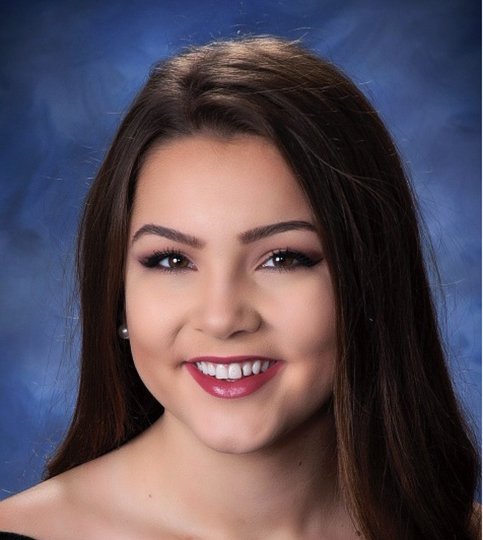JESSIEVILLE -- Caddo Lowery, co-valedictorian of the 2016 class of Jessieville High School, received three substantial scholarships to the University of Arkansas at Little Rock, including two for inclusive programs on campus.
Lowery graduated with her class May 21 as the co-valedictorian, along with Jonathan Semmler, with a 4.1 grade-point average and a score of 30 on the ACT. She is the daughter of Bryan and Marci Lowery.
The most financially significant award, the Chancellor's Academic Distinction Scholarship, will provide Lowery with $10,000 per school year for the next four years. Recipients must have a 3.5 GPA and earn a 30 on the ACT, a 1330 on the SAT or be a National Merit/Achievement Finalist.
Lowery plans to major in Biology as a premedical student. She has hoped to become a trauma surgeon after school.
Her final choices were UALR and the University of Central Arkansas in Conway. Lowery's ACT score qualified her for the Excellence Scholarship from UCA, which provides $6,500 per year.
"I was deciding between those two and getting all of those scholarships for UALR is what made me choose it," Lowery said.
Lowery was confident she would receive the Distinction Scholarship based on her academic success. Her other two scholarships took additional factors into consideration and incorporate more involvement on campus.
The Chancellor's Leadership Corps Scholarship provides as much as $8,000 per school year. A 3.0 GPA is required. Candidates are invited to the campus for interviews and recommendation letters from high school officials are encouraged.
The CLC program is designed to help students develop and enhance their skills to assume leadership positions on campus and after they graduate. Participants stay involved in campus events and organizations.
Lowery's group interview was held with 10 other students while multiple other interviews were conducted at the same time. The interview panel consisted of a UALR staff member, a CLC alum and two students still in the program.
"It was actually a little bit more intimidating because you had to answer in front of about 15 other people," Lowery said.
The scholarship can be renewed each year based on performance results. Scholars must take Personal Awareness courses in their first three semesters.
Every student in the program must complete 15 hours of service learning during the fall and spring semesters. Last year's class included 176 students with an average GPA of 3.65 and an average ACT score of 23.3. The previous class of 187 students had an average GPA of 3.66 and an average ACT score of 23.8.
Lowery's third scholarship for the University Science Scholars Program places an emphasis on academic focus in a community environment. The award provides as much as $3,000 per year.
The program was developed with funds from the National Science Foundation and is currently funded by the university. According to the program, scholarships are awarded primarily on the basis of academic accomplishments, but financial need is also considered. A student who is fully funded by other scholarships can still be a member of the program to receive mentoring services and participate in all of its enrichment activities.
A minimum of a 3.0 GPA, a 24 on the ACT or 1110 on the SAT and a top 20 percent class ranking are required. Students in the program must major in the fields of biology, chemistry, physics or mathematics.
The application requires two recommendation letters and a 500-word essay on their personal interests, goals, work habits and strengths. Lowery's recommendation letters were submitted by Jessieville High School teachers Stephanie Riley and Liz Schiefer.
"An important purpose of the science scholarship is to provide students with sufficient money so that they can concentrate full time on their schoolwork," according to the program's information. "If students work full time on school, they probably will have no trouble meeting the requirements to retain their scholarship."
The scholarship is renewed by students completing 27 credit hours as a freshman and 30 each subsequent year, completing courses in their majors as recommended by program advisers and maintaining a 3.0 GPA with a major GPA of 3.25.
The program's information expresses the idea that "employment and wages could jeopardize the student's eligibility for financial aid based on their financial need. Moreover, work could jeopardize a student's academic progress and retention of the scholarship."
University Science Scholars take Science Skills as a freshman to help them adjust to the college environment and get a head start in their majors. They are included in a small learning community with students majoring in math and science.
"You have the opportunity to live in STEM housing, which is people of your same majors," Lowery said. "So I can have help."
Social events are held throughout the year to help students get to know their classmates and teachers. Opportunities for professional growth are offered through special sessions.
The program provides optional workshops, field trips to employers, research seminars by visiting scientists and opportunities for research and internships. Scholars participate in undergraduate research and internships across the country every year and present their work at local, regional and national conferences.
Lowery said she is excited to learn and work on meaningful topics which will help in her future career. She sang with multiple groups outside of school and in choir at Jessieville with Lydia Desambourg, but is unsure if she will sing with any groups in Little Rock.
"This whole time I have been focused on medical school, but I have been thinking more about dental school just because my uncle is a dentist," Lowery said. "I have connections there."
Lowery said she could practice in Arkansas after she completes her degrees, but could explore opportunities in other states.
Local on 05/26/2016